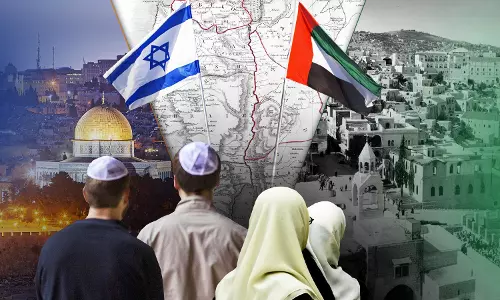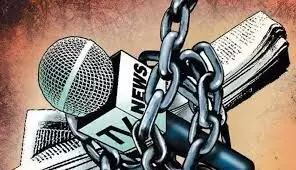
Death knell for media freedom
text_fieldsWhen President Ramnath Kovind, Vice President Venkaiah Naidu and Prime Minister Narendra addressed the webinar in connection with the National Press Day on Monday, what stood out was the unanimous lectures with the precept that media freedom formed the soul of democracy. The Vice President exhorted all to stoutly oppose and defeat any move to put checks on media freedom. The Prime Minister praised the contribution made by media for the democratic values of the country. The voice of home minister Amit Shah harped on the same saying the government is committed to the freedom of the press. When such assertions and assurances come from four key leaders holding the reins of the country, not only media organisations and mediapersons but the entire democratic community of the country would give applause. This may even be a moment of excitement to dream that a golden era of freedom and protection is about to dawn for the media, the fourth pillar of democracy.
But what would disappoint us is the descent from dream to reality. In a study conducted by the international body 'Reporters Without Borders', the rank of India in media freedom was 138 in 2015, but in 2020 it slipped to 142. And this dubious distinction when a country like Afghanistan, a war-torn country where even basic law and order lies shattered, stands at 122, higher than India. Also to be remembered is the fact that this lower ranking comes not out of any moves by the Modi government to bring in any draconian laws to muzzle the press. The study points out factors that affect media freedom such as police atrocities against mediapersons, misbehaviour by political workers and threats from criminals and corrupt officials. There is also the finding that the severe pressure to coerce the media into toeing the line of the prime minister's ruling party and the Hindutva government, also hampers media freedom. In addition, the media watchdog cites the hate campaigns against mediapersons who express, in print or audio-visual mode, critical opinions that are unpalatable to the Hindutva forces and branding of such criticisms as 'anti-national' in an attempt to silence them. There are also instances where journalists critical of authorities being charged for offences of sedition which can bring punishment upto life imprisonment. The reason for India's ranking to go down is also media-repressive measures in Kashmir following the repeal of the special rights of Jammu-Kashmir, and even stripping it of its status as a state, and the complete blocking of media activity with scores of mediapersons being put behind bars. Journalists from outside, either within India or from abroad, are barred from entering there too.
To make matters all the worse, most recently the government issued orders bringing online news portals and OTT (Over The Top) platforms under the ambit of the union Information & Broadcasting ministry. Popular OTT platforms like Netflix and Amazon Prime Video thus come under the ministry's scanner as will social media outlets like Facebook, Twitter and Instagram. The government claims that the measure is aimed at preventing spread of fake news, hate propaganda and misogynous posts - which certainly deserve to be stopped. But going by past experience, there is an undeniable possibility of a government, which has never proved its commitment to democracy, secularism or morality, and its implementing functionaries misusing such powers. Any one who comes forward to cite such excesses risks being booked. The safe and healthy course would be for media entities to make a code of conduct by themselves, supplemented by a mechanism to punish when violations are brought to light in time and after due process. It is only after such a course is put to test and then is found to fail that more stringent controls should be attempted. The current move will tantamount to sharpening the already existing weapons. It will only further weaken the already fragile media freedom.























